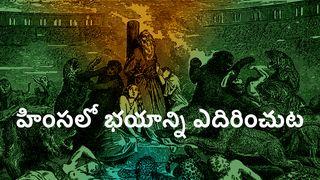Learning to Trust God in the Psalmsనమూనా

Psalm 49: Trust and Selah
“This is the fate of those who trust in themselves, and of their followers, who approve their sayings.
Selah
Like sheep they are destined for the grave, and death will feed on them. The upright will rule over them in the morning; their forms will decay in the grave, far from their princely mansions. But God will redeem my life from the grave; he will surely take me to himself.
Selah”
Psalm 49:13 –15 (NIV84)
Think of a moment when someone clearly and thoroughly, with much detail, communicated something to you. Then, having listened to the entire explanation, you respond in jest with a slight smile on your face by saying, “So, your point is?!” Throughout this Psalm, the author is clearly and thoroughly challenging the reader to soberly consider who and what they are trusting to lead them to a meaningful life and future. He does not pull any punches.
For fourteen verses, he pounds away at the futility of trusting in oneself or what others say to be trustworthy. Then, in verse fifteen, he pauses to point to the Redeemer of life for those who trust in Him. Let’s expand on his nod to the beauty of trusting in God.
He wrote of the redemption that awaited him. Redeem. What a beautiful word. A holy word. This word represents one of the greatest attributes of our God. He redeems. He has showcased His redemptive behavior on many occasions, as recorded in the Scriptures. He did so with Adam and Eve in the Garden of Eden, to those upon Noah’s Ark, to the Israelites who were enslaved to the Egyptians, to Daniel in the Lion’s Den, and many others. The stories of the Star of Bethlehem and the Cross of Calvary were His greatest acts of redemption. Shining brightly and shaking the heavens and earth, these redemptive moments proclaimed the Father’s enduring love and grace for all who would trust Him.
Trust: What a powerful word! Its reach is both scary and rewarding. It can lead to destruction or redemption. The key is who and what you put your trust in. Trusting in money, possessions, aspiring to live a certain lifestyle, and what others say to be trustworthy, as well as trusting only what you can see or do for yourself, can lead to devastating consequences. On the other hand, to trust in God's sovereignty and grace can lead to moments that prove God's faithfulness and capacity to do what we cannot do for ourselves.
Selah: Do you see this word at the end of verses thirteen and fifteen? It is a Hebrew word that Bible translators have struggled to define. Most translators believe it to be a musical word instructing the vocalist, instrumentalist, and the audience to pause and sincerely consider what was read or sung. They would stop singing and playing their instruments and allow silence to fill the room. The audience was to reflect upon what had just been sung or read. The first pause was about the fate of those who do not trust in God, while the second was about the beauty of trusting in God.
Friend, think about it. Frequently, we should pause (Selah) and consider where or upon whom we are placing our trust. The sooner we recognize we are not strong enough, resourceful enough, or intelligent enough to satisfy or remedy many of our issues and choose to trust God for our life journey, the healthier we will be.
The Psalmist was not concerned with the how-tos of trusting God. He was concerned with exposing the consequences of not doing so. As such, this Psalm is like a flashing red light warning the readers of the dangers that are ahead should they not pause and consider their ways.
One last thought. In every relationship where trust is present, trust can be observed. Trust is visible in the behaviors, decisions, and interactions of a relationship. When I place my trust in God, I am choosing to trust Him to be who He says He will be in the relationship. My trust governs my choices. Trusting in the Creator of all things, the One True Redeemer, and the Most High God who is Sovereign Over All is a trustworthy decision to make and to honor.
I encourage you to Selah on this day and surrender yourself and the issues of this day to Him. Think about what it means to trust Him in those circumstances. When your faith is challenged, ask yourself, “How does a person who trusts God behave in a moment like this? What should trust look like in me for this moment? Am I acting like one who places their trust in God?” If you are unsure, call a trusted friend who trusts in God and share your reservations and concerns with them. Listen for the counsel of God and act accordingly.
Selah
వాక్యము
ఈ ప్రణాళిక గురించి

When we trust in the Lord, especially when we are surrounded by challenging circumstances, something amazing happens. A divine exchange occurs. What could not be perceived or experienced before that moment is now available to us. We see differently. We act differently. Emotionally, mentally, and spiritually, we are changed. Because of the Lord in us and our trust in Him, we will endure. This plan was created from reflections on the Psalms by Pastor Berry Johnston.
More







